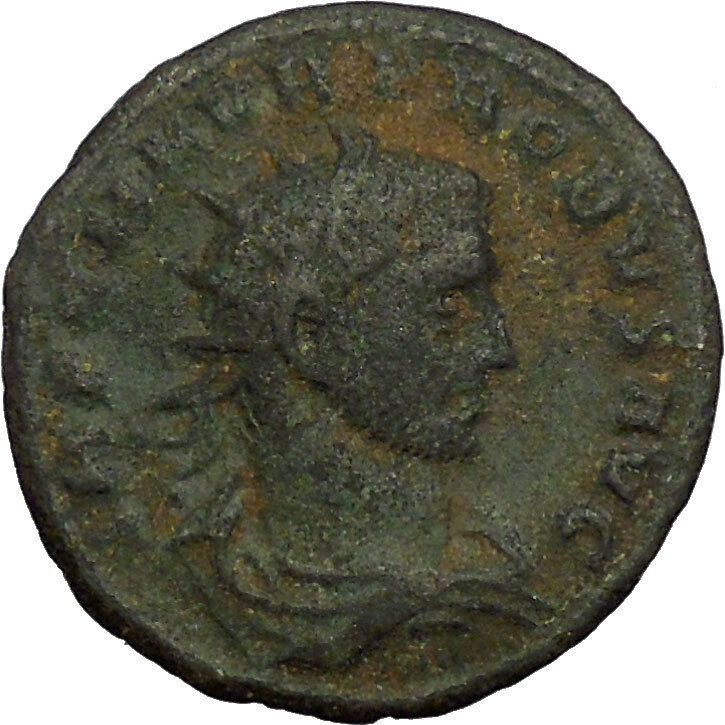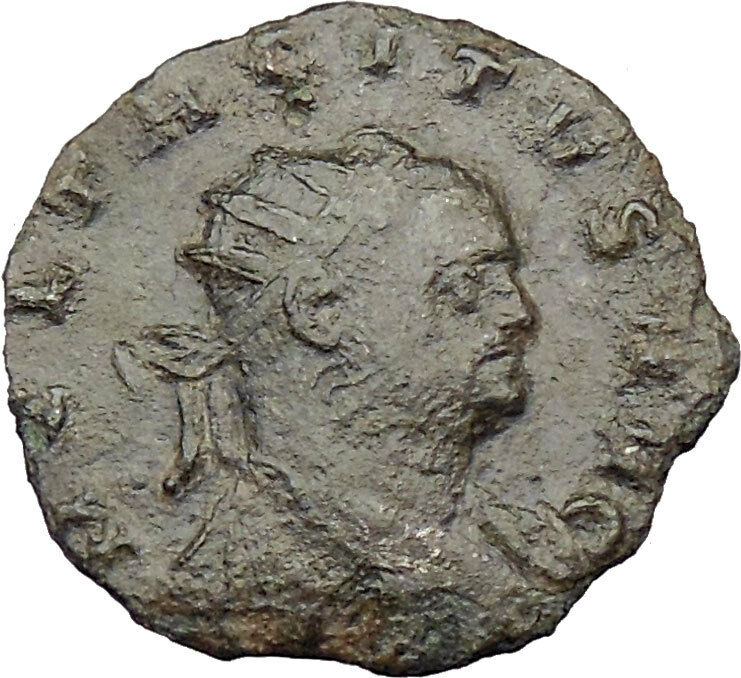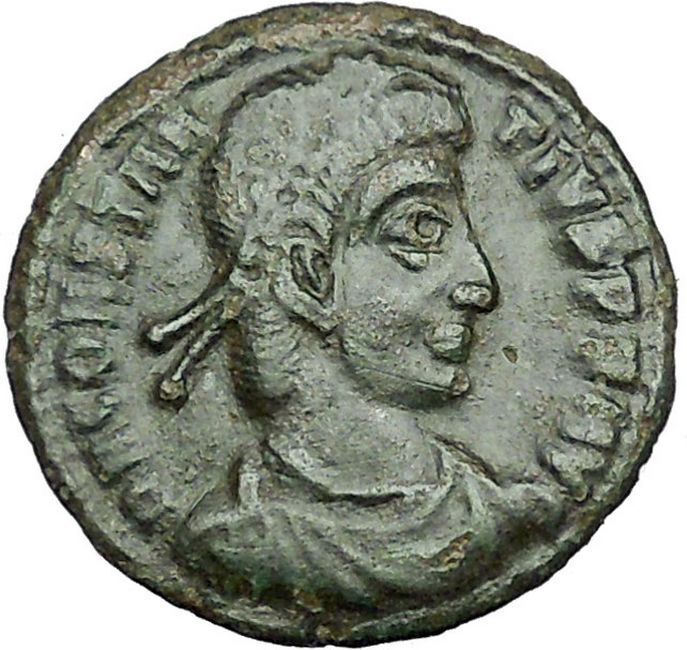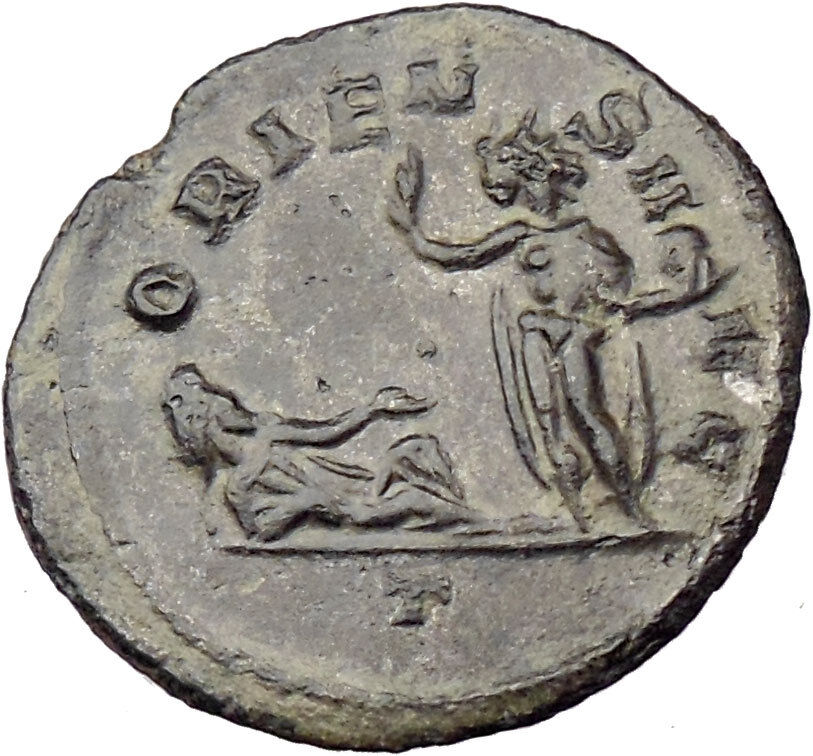|
Faustina II – Roman Empress & Wife of Emperor Marcus Aurelius – 161-175 A.D.
Bronze Sestertius 30mm (25.04 grams) Rome mint, struck circa 154-157 A.D.
Reference: RIC 1371; Cohen 25; Sear 4711
FAVSTINA AVGVSTA, draped bust right.
AVGVSTI PII FIL, Spes walking left, holding flower and raising hem of robe.
* Numismatic Note: The green spot on the bun of the hair appears to be inert as it does not powder and I was able to find the original picture from an auction dated May 21, 2013 where the same spot is present and the coin looks the same. Wholesome and attractive ancient coin.
You are bidding on the exact item pictured, provided with a Certificate of Authenticity and Lifetime Guarantee of Authenticity.
In ancient Roman religion, Spes was the goddess of hope. Multiple temples to Spes are known, and inscriptions indicate that she received private devotion as well as state cult.
Republican Hope
During the Republic, a temple to “ancient Hope” (Spes vetus) was supposed to have been located near the Praenestine Gate. It was associated with events that occurred in the 5th century BC, but its existence as anything except perhaps a private shrine has been doubted.
A well-documented temple of Spes was built by Aulus Atilius Calatinus along with Fides, as the result of vows (vota) made to these goddesses during the First Punic War.
At Capua in 110 BC, a temple was built to the triad of Spes, Fides, and Fortuna.
Imperial Hope
Spes was one of the divine personifications in the Imperial cult of the Virtues. Spes Augusta was Hope associated with the capacity of the emperor as Augustus to ensure blessed conditions.
Like Salus (“Salvation, Security”), Ops (“Abundance, Prosperity”), and Victoria (“Victory”), Spes was a power that had to come from the gods, in contrast to divine powers that resided within the individual such as Mens (“Intelligence”), Virtus (“Virtue”), and Fides (“Faith, Fidelity, Trustworthiness”).
Greek Elpis
The Greek counterpart of Spes was Elpis, who by contrast had no formal cult in Greece. The primary myth in which Elpis plays a role is the story of Pandora. The Greeks had ambivalent or even negative feelings about “hope”, and the concept was unimportant in the philosophical systems of the Stoicss and Epicureans.
Modern literature
In Rick Riordan’s The Heroes of Olympus series, the Day of Hope (also known as the Feast of Spes), which falls on August 1, is chosen by the series main antagonist, the primordial goddess, Gaia, as the day of her awakening. This is done with the irony that the day when humanity would place their hope to their highest would be the day when they would lose all their hope forever.
 Annia Galeria Faustina Minor (Minor Latin for the younger), Faustina Minor or Faustina the Younger (February 16 between 125 and 130-175) was a daughter of Roman Emperor Antoninus Pius and Roman Empress Faustina the Elder. She was a Roman Empress and wife to her maternal cousin Roman Emperor Marcus Aurelius. Though Roman sources give a generally negative view of her character, she was held in high esteem by soldiers and her own husband and was given divine honours after her death. Annia Galeria Faustina Minor (Minor Latin for the younger), Faustina Minor or Faustina the Younger (February 16 between 125 and 130-175) was a daughter of Roman Emperor Antoninus Pius and Roman Empress Faustina the Elder. She was a Roman Empress and wife to her maternal cousin Roman Emperor Marcus Aurelius. Though Roman sources give a generally negative view of her character, she was held in high esteem by soldiers and her own husband and was given divine honours after her death.
Faustina, named after her mother, was her parents’ fourth and youngest child and their second daughter; she was also their only child to survive to adulthood. She was born and raised in Rome.
Her great uncle, the Emperor Hadrian, had arranged with her father for Faustina to marry Lucius Verus. On February 25, 138, she and Verus were betrothed. Verus’ father was Hadrian’s first adopted son and his intended heir. However when Verus’ father died, Hadrian chose Faustina’s father to be his second adopted son, and eventually, he became Hadrian’s successor. Faustina’s father ended the engagement between his daughter and Verus and arranged for Faustina’s betrothal to her maternal cousin, Marcus Aurelius; Aurelius was also adopted by her father. On May 13, 145, Faustina and Marcus Aurelius were married. When her father died on March 7, 161, her husband and Lucius Verus succeeded to her father’s throne and became co-rulers. Faustina was given the title of Augusta and became Empress.
Unfortunately, not much has survived from the Roman sources regarding Faustina’s life, but what is available does not give a good report. Cassius Dio and the Augustan History accuse Faustina of ordering deaths by poison and execution; she has also been accused of instigating the revolt of Avidius Cassius against her husband. The Augustan History mentions adultery with sailors, gladiators, and men of rank. However, Faustina and Aurelius seem to have been very close and mutually devoted. Her husband trusted her and defended her vigorously against detractors.
Faustina accompanied her husband on various military campaigns and enjoyed the love and reverence of Roman soldiers. Aurelius gave her the title of Mater Castrorum or Mother of the Camp. Between 170-174, she was in the north, and in 175, she accompanied Aurelius to the east. However, these experiences took their toll on Faustina, who died in the winter of 175, after an accident, at the military camp in Halala (a city in the Taurus Mountains in Cappadocia).
Aurelius grieved much for his wife and buried her in the Mausoleum of Hadrian in Rome. She was deified: her statue was placed in the Temple of Venus in Rome and a temple was dedicated to her in her honor. Halala’s name was changed to Faustinopolis and Aurelius opened charity schools for orphan girls called Puellae Faustinianae or ‘Girls of Faustina’.[1] The Baths of Faustina in Miletus are named after her.
In their thirty years of marriage, Faustina bore Marcus Aurelius thirteen children:
-
Annia Aurelia Galeria Faustina (147-after 165)
-
Gemellus Lucillae (died around 150), twin brother of Lucilla
-
Annia Aurelia Galeria Lucilla (148/50-182), twin sister of Gemellus, married her father’s co-ruler Lucius Verus
-
Titus Aelius Antoninus (born after 150, died before 7 March 161)
-
Titus Aelius Aurelius (born after 150, died before 7 March 161)
-
Hadrianus (152-157)
-
Domitia Faustina (born after 150, died before 7 March 161)
-
Fadilla (159-after 211)
-
Annia Cornificia Faustina Minor (160-after 211)
-
Titus Aurelius Fulvus Antoninus (161-165), twin brother of Commodus
- Commodus (161-192), twin brother of Titus Aurelius Fulvus Antoninus, later emperor
- Marcus Annius Verus Caesar (162-169)
- Vibia Aurelia Sabina (170-died before 217)
|





 Annia Galeria Faustina Minor (Minor Latin for the younger), Faustina Minor or Faustina the Younger (February 16 between 125 and 130-175) was a daughter of Roman Emperor Antoninus Pius and Roman Empress Faustina the Elder. She was a Roman Empress and wife to her maternal cousin Roman Emperor Marcus Aurelius. Though Roman sources give a generally negative view of her character, she was held in high esteem by soldiers and her own husband and was given divine honours after her death.
Annia Galeria Faustina Minor (Minor Latin for the younger), Faustina Minor or Faustina the Younger (February 16 between 125 and 130-175) was a daughter of Roman Emperor Antoninus Pius and Roman Empress Faustina the Elder. She was a Roman Empress and wife to her maternal cousin Roman Emperor Marcus Aurelius. Though Roman sources give a generally negative view of her character, she was held in high esteem by soldiers and her own husband and was given divine honours after her death.




